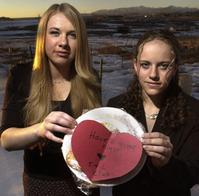| Sunday, February 6, 2005 |
| The Economics of Sharing |
 The Economist has a little article on The economics of sharing. It has some good stuff. It is also somewhat amusing to hear about economists pulling their hair out trying to understand why people share, when they're supposed to just be self-serving consumers and capitalists. The Economist has a little article on The economics of sharing. It has some good stuff. It is also somewhat amusing to hear about economists pulling their hair out trying to understand why people share, when they're supposed to just be self-serving consumers and capitalists.Economists have not always found it easy to explain why self-interested people would freely share scarce, privately owned resources. Their understanding, though, is much clearer than it was 20 or 30 years ago: co-operation, especially when repeated, can breed reciprocity and trust, to the benefit of all. In the context of open source, much has been written about why people would share technical talent, giving away something that they also sell by holding a job in the information-technology industry. The reason often seems to be that writing open-source software increases the authors' prestige among their peers or gains them experience that might help them in the job market, not to mention that they also find it fun. Seems like one can't get around the subject any longer, when talking about economics. And the interesting part remains how and how quickly and widely sharing will spread to more tangible goods. The question is, can sharing be used to supply more than just information? One of the most articulate proponents of the open-source approach, Yochai Benkler of Yale Law School, argues in a recent paper that sharing is emerging for certain physical, rivalrous goods and will probably increase due to advances in technology. Where open source was about sharing information by way of the internet, what is happening now, Mr Benkler notes, is the sharing of the tangible tools of technology themselves, like computing power and bandwidth. This is because they are widely distributed among individuals, and sold in such a way that there is inherent (and abundant) unused capacity. He's talking about social sharing as a "third mode of organising economic production, alongside markets and the state". Well, maybe we can call it that. But the networks for sharing are also a market. Just a market that measures value somewhat differently. It is an interesting, even if obvious, key point that sharing is most likely to emerge when something is available that has inherent and abundant unused capacity. Probably isn't important that it is sold. It is important that there's an abundance of something, and some kind of informational system exists that allows some of that abundance to be directed to where else it might be needed and appreciated. For that matter, that little phenomenon could be the basis of a whole new kind of civilization. The networking of excess capacity. That's what a traditional market does too, but from a very different angle. A guy who owns a factory figures out how to finance the cheap production of millions of widgets, and he gets them into the hands of people who want them, and gets paid for it. Wheras the sharing phenomenon tends to start off with stuff that's somehow already paid for, or that is perceived to be. I've already gathered my MP3 collection, and I'm paying for my DSL line anyway, so if somebody can use some of it, even if I get nothing directly out of it, that's fine. Better information and better networking will make more things sharable. If somebody came up with something that would scan the titles of my old books and found takers for them automatically, I might not throw them away. If somebody comes up with a sufficiently efficient way of sharing cars, and always being able to find one close by, I wouldn't need to own one. Several companies are already doing that pretty well in certain limited areas. Seems like it is not just that there are economic markets and there is open source sharing. Most likely more hybrids will pop up. There are some very different basic aims involved, which wouldn't really have to be that different. There's the traditional capitalist motivation where you mass produce something as cheaply as possible and you "share" it in a direct one-to-one exchange with people who want it. Your aim was profitable exchange, but not really the sharing as such. And then there's the more open source kind of thinking, where you try to come up with something that is as easily sharable as possible. And then you secondarily might derive income from the increased advantages that come from that. The focus is switching towards drawing economic advantage from the flow of stuff from where it is abundant to where it isn't, as opposed to from taking payment for the stuff itself. Like, information is becoming very free and freely available, but there's a business in making a search engine that finds it for you, even if it is just by serving you some ads along with it. Really it isn't as new as it seems. When Exxon sells you some oil, it is really only because they found it lying around somewhere, and they took it and brought it to you, and it would have been difficult for you to do that yourself. But they didn't make it, they just took it and pretended they owned it. Most economic engines start off with something like that, even if it is made to look a lot more complicated. Generally somebody grabbed something that was lying around and processed it somehow and transported it to you, and they pretend they made it and they own it, and therefore you have to pay. Where really it is more the processing and transportation they did. The farmer didn't invent pigs. He just fed them for a while, loaded them in a truck, took them to the butcher, etc. The newspaper is printed on paper made from trees pulled out of the ground and transported. Not by anybody who truly owned those trees in the universal scheme of things, just by somebody who pretended they did. So we could say that the sharing mentality rather starts with the idea that things are inherently free. Or we can see it the other way. Nothing is really ours, it is all stuff that comes from somewhere else, that we temporarily have use of. My music files, my ideas, my computer bandwidth. It is all coming from somewhere else that I don't quite control. Good will, gratitude, reputation, prestige, cooperation - those are qualities that emerge when we take ownership and control out of the equation. Are they more natural? I don't know, I'd like to think so. But even if that wasn't a given, and even if they aren't inherently stronger forces than greed and control, things can very well be arranged so that they will dominate the playing field. One can produce things so that they inherently aren't owned. Some free software licenses will specify that the software has to remain free, and you have to pass on the same license if you improve on them. Thus there's no power in direct ownership any longer, and you're instead forced to traffic in the economy of good will and recognition of good work. More tangible products could be made in a similar fashion. Again, we're seeing it first with information products. You can make a song and give it a license that specifies that it has to remain free, but that you always want to be credited for it. So the only way people have of generating value is not by owning it, but by sharing it, talking about it, improving it, categorizing it, etc. They might be paid for that, but they can't ever be paid for owning it. Sharing and things being free aren't the same thing of course. I'd like everything to be free, but that's a more long-term project than sharing is. Sharing doesn't mean things don't cost anything. Just that the value of something can be leveraged by sharing it. Can bicycles be free? It is possible. But it is more likely that somebody makes a scheme that lets me pay a little bit every month and that bicycles then become abundant, so I don't have to worry much about holding on to one. The new thing is the potential to base economics on the sharing of abundance, rather than the metered access to scarcity. With some luck the economists will make some more calculations and realize that there's much more profit to be made by creating and sharing abundance than there is in reluctantly selling scarce items. Because, well, there's a scarcity of scarcities, but there's unlimited potential in abundance and new ways of sharing. [ Information | 2005-02-06 03:41 | 6 comments | PermaLink ] More > |
| The Cuddly Menace |
 Via BoingBoing and others. Somebody found a book in the supermarket called "My Little Golden Book About God" and decided to remix it a little. You know, it is one of those little supposedly cuddly and sweet religious things about the glory of God. Which for some reason often are filled with strange drawings of kids that look really psychotic. So it is quite appropriate to change it into the story of the evil Zoggs who're carrying out their master plan of turning humans into their slaves. Very masterfully done. Via BoingBoing and others. Somebody found a book in the supermarket called "My Little Golden Book About God" and decided to remix it a little. You know, it is one of those little supposedly cuddly and sweet religious things about the glory of God. Which for some reason often are filled with strange drawings of kids that look really psychotic. So it is quite appropriate to change it into the story of the evil Zoggs who're carrying out their master plan of turning humans into their slaves. Very masterfully done.[ Culture | 2005-02-06 14:16 | 6 comments | PermaLink ] More > |
| Don't give cookies to that woman |
 It got a lot of press, but maybe you didn't hear about it. Two teenage girls living in rural Durango, Colorado decided one evening to bake cookies and deliver plates of them to their neighbors, decorated with hearts and friendly messages. They baked chocolate-chip and sugar cookies, and cut out big hearts from pink construction paper, and wrote "Have a Great Night!" on them. Just to be nice. Random act of kindness. Pay it forward. But one of those neighbors, who apparently is living in her own little strange world of terror, where everybody would be expected to attack her at any time, had a fit, thought somebody was going to break in and burglarize her, called the police, and generally got so upset that she checked herself into the hospital, thinking she was getting a heart attack from anxiety. Sounds like she's somebody who really could have used a plate of cookies and a friendly unthreatening message of kindness. But no, she then sued the two girls for her medical expenses and some judge agreed with her and ordered them to pay her $900. For delivering free cookies to her. So, if you ever had planned to do anything unexpectedly nice for Wanita Renea Young in Durango, you've better take her off your list! It got a lot of press, but maybe you didn't hear about it. Two teenage girls living in rural Durango, Colorado decided one evening to bake cookies and deliver plates of them to their neighbors, decorated with hearts and friendly messages. They baked chocolate-chip and sugar cookies, and cut out big hearts from pink construction paper, and wrote "Have a Great Night!" on them. Just to be nice. Random act of kindness. Pay it forward. But one of those neighbors, who apparently is living in her own little strange world of terror, where everybody would be expected to attack her at any time, had a fit, thought somebody was going to break in and burglarize her, called the police, and generally got so upset that she checked herself into the hospital, thinking she was getting a heart attack from anxiety. Sounds like she's somebody who really could have used a plate of cookies and a friendly unthreatening message of kindness. But no, she then sued the two girls for her medical expenses and some judge agreed with her and ordered them to pay her $900. For delivering free cookies to her. So, if you ever had planned to do anything unexpectedly nice for Wanita Renea Young in Durango, you've better take her off your list!
Now, this little event in itself might seem terribly unimportant for the world situation. And yet it was mentioned in most of the news outlets I normally look at. And I'm sure lots of people quote it and talk about it and pass it around. And that is what is fabulous. Almost anybody who hears the story will be outraged. It is unjust, unfair and mean what happened there. Sends a message that kindness isn't worth the trouble. But the uproar about it sends the opposite message. There's plenty of people in the world who think that kindness is a great thing, to be encouraged, rewarded, cultivated. The majority of people, really. So imagine for a moment a world where you can't get away with even the smallest injustice. You might get away with it at first, but your public reputation will forever keep a record of what you did. That's a great benefit of easily shared communication. [ Inspiration | 2005-02-06 15:00 | 5 comments | PermaLink ] More > |